Blockchain developers are at the forefront of technological innovation, creating the backbone for decentralized applications. They build and maintain blockchain systems, which are critical for ensuring secure and transparent digital transactions.
Skills required for a blockchain developer include proficiency in programming languages like Solidity, understanding of blockchain architecture, and abilities in problem-solving and analytical thinking.
Candidates can write these abilities in their resumes, but you can’t verify them without on-the-job Blockchain Developer skill tests.
In this post, we will explore 8 essential Blockchain Developer skills, 9 secondary skills and how to assess them so you can make informed hiring decisions.
Table of contents
8 fundamental Blockchain Developer skills and traits
The best skills for Blockchain Developers include Smart Contract Development, Blockchain Architecture, Cryptography, Ethereum Platforms, Data Structures, Consensus Algorithms, Network Security and API Integration.
Let’s dive into the details by examining the 8 essential skills of a Blockchain Developer.
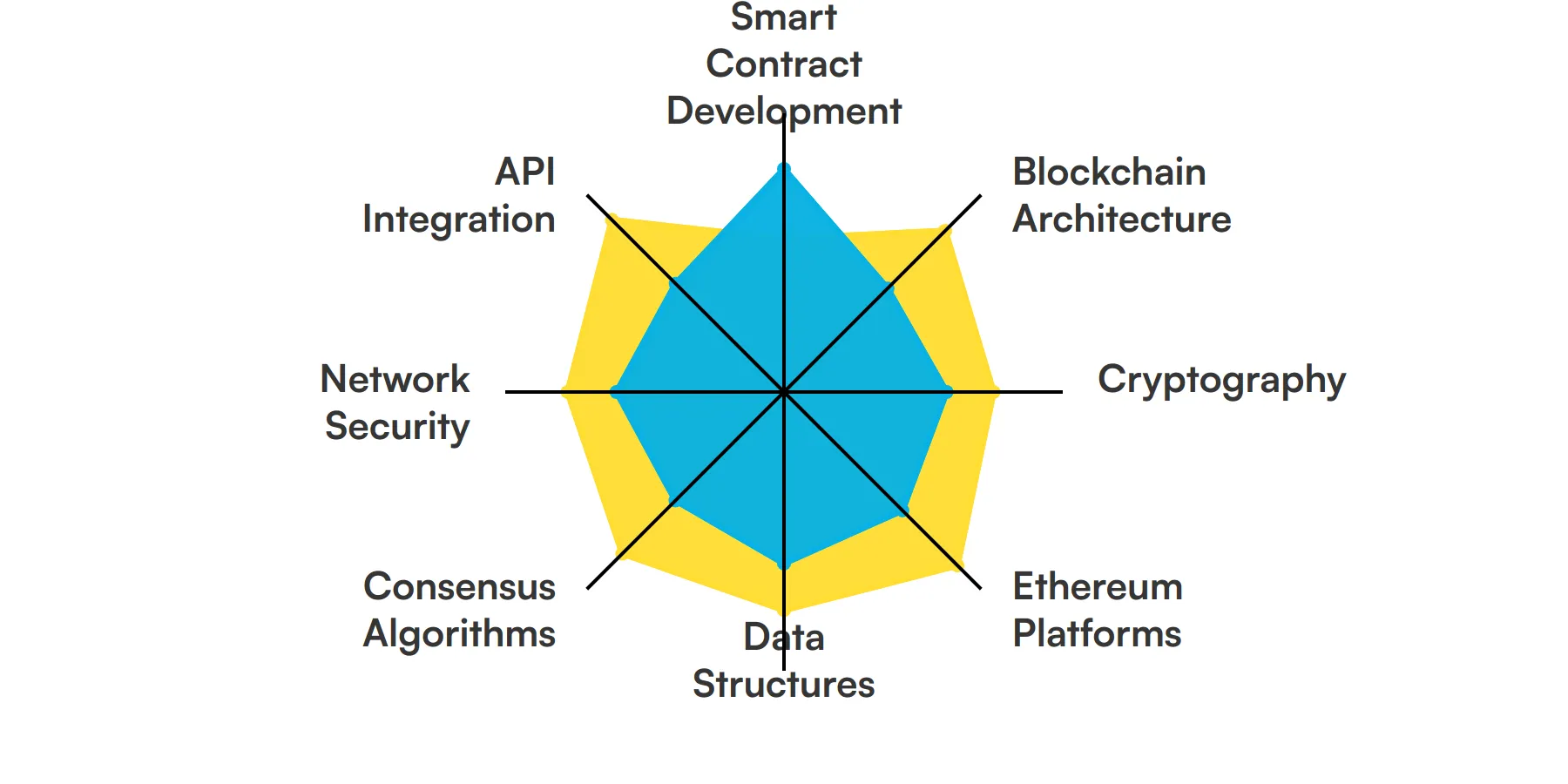
Smart Contract Development
Blockchain developers must be adept at creating, testing, and deploying smart contracts, which are self-executing contracts with the terms directly written into code. These contracts automate transactions and enforce agreements across the blockchain network, reducing the need for intermediaries.
For more insights, check out our guide to writing a Solidity Developer Job Description.
Blockchain Architecture
Understanding the foundational structures of blockchain technology, including decentralized and distributed networks, is crucial for a blockchain developer. This knowledge helps in designing and implementing secure and scalable blockchain solutions tailored to specific business needs.
Cryptography
Cryptography is the backbone of blockchain security, enabling secure transactions, data encryption, and consensus protocols in a trustless environment. Blockchain developers use cryptographic techniques like hash functions and digital signatures to ensure data integrity and authentication.
Check out our guide for a comprehensive list of interview questions.
Ethereum Platforms
Proficiency in Ethereum, including development frameworks like Truffle and Hardhat, is essential for blockchain developers, especially for those working on decentralized applications (DApps). Understanding Ethereum allows developers to create versatile and complex applications on its platform.
Data Structures
Advanced knowledge of data structures such as Merkle trees, Patricia trees, and cryptographic hash functions is necessary for optimizing and securing blockchain applications. These structures help in efficiently managing data and ensuring quick, secure transactions.
Consensus Algorithms
Blockchain developers need to understand various consensus mechanisms like Proof of Work (PoW), Proof of Stake (PoS), and Delegated Proof of Stake (DPoS). These algorithms help maintain the integrity and agreement across the blockchain network without a central authority.
For more insights, check out our guide to writing a Blockchain Developer Job Description.
Network Security
Securing a blockchain network against potential threats like double-spending, 51% attacks, and other vulnerabilities is a key responsibility of a blockchain developer. This involves implementing security practices and protocols to safeguard the network.
API Integration
Integrating various APIs for blockchain transactions, smart contracts, or external data feeds is a common task for blockchain developers. This skill ensures that blockchain applications can interact seamlessly with other software and services.
Check out our guide for a comprehensive list of interview questions.
9 secondary Blockchain Developer skills and traits
The best skills for Blockchain Developers include Node.js, Solidity, Database Management, Cloud Technologies, Frontend Development, Version Control, Testing Frameworks, Agile Methodologies and Networking.
Let’s dive into the details by examining the 9 secondary skills of a Blockchain Developer.
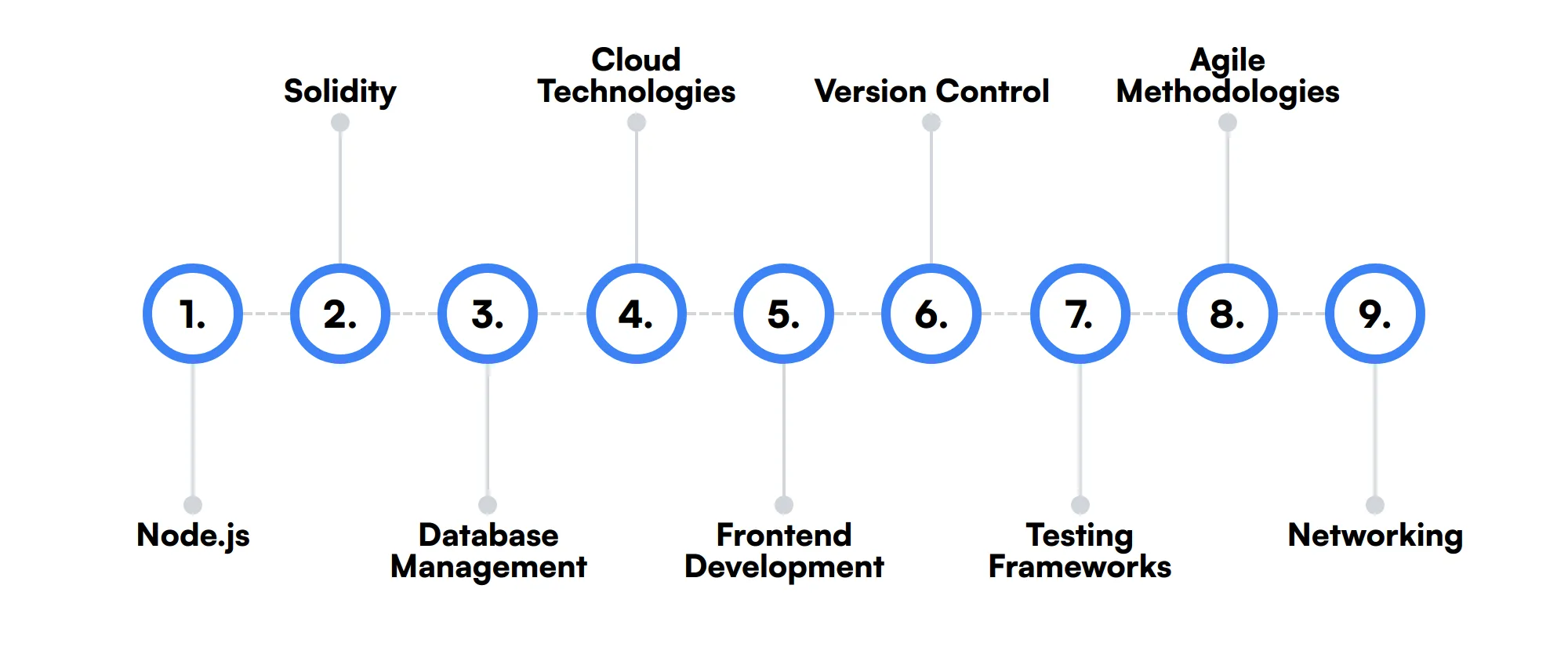
Node.js
Many blockchain applications are developed using JavaScript and Node.js, making it a useful skill for setting up and managing the backend of blockchain applications.
Solidity
Solidity is a programming language designed for developing smart contracts that run on the Ethereum blockchain, a common requirement for many blockchain development projects.
Database Management
Understanding database solutions compatible with blockchain technologies, such as LevelDB or Redis, helps in managing data off-chain and scaling applications effectively.
Cloud Technologies
Knowledge of cloud platforms like AWS, Azure, or Google Cloud is beneficial for deploying and managing blockchain applications, facilitating scalability and accessibility.
Frontend Development
For blockchain developers working on DApps, skills in frontend development including frameworks like React or Angular are important for creating user-friendly interfaces.
Version Control
Proficiency in version control systems such as Git is essential for collaborative blockchain development, allowing changes to be tracked and managed efficiently.
Testing Frameworks
Experience with testing frameworks and continuous integration tools ensures that blockchain applications are reliable, secure, and bug-free prior to deployment.
Agile Methodologies
Familiarity with agile development practices supports the iterative and incremental development of blockchain applications, adapting quickly to changing requirements.
Networking
Understanding the basics of computer networking helps blockchain developers in setting up and maintaining the communication between different nodes in a blockchain network.
How to assess Blockchain Developer skills and traits
Assessing the skills and traits of a Blockchain Developer can be a challenging task, given the specialized knowledge and technical expertise required in this field. It's not just about what they know, but how well they can apply that knowledge to real-world problems. From Smart Contract Development to Network Security, a comprehensive evaluation is necessary to ensure that the candidate is well-versed in all critical areas.
Traditional resumes and interviews often fall short in providing a complete picture of a candidate's capabilities. This is where skills-based assessments come into play. By leveraging tools like Adaface assessments, you can significantly improve the quality of your hires and reduce screening time by 85%. These assessments are designed to test a candidate's proficiency in key areas such as Blockchain Architecture, Cryptography, and Consensus Algorithms, among others.
When assessing a Blockchain Developer, it's important to consider their practical experience with Ethereum Platforms, their understanding of Data Structures, and their ability to integrate APIs. These skills are not only fundamental but also indicative of their ability to handle complex blockchain projects. By using targeted assessments, you can ensure that your candidates possess the necessary skills to excel in your specific role.
Let’s look at how to assess Blockchain Developer skills with these 6 talent assessments.
Solidity Test
Our Solidity Test assesses proficiency in the Solidity programming language, which is used to write smart contracts on the Ethereum blockchain.
The test evaluates candidates' knowledge of key Solidity concepts, including data types, control structures, and function and event handling. It also covers contract deployment, debugging, and security considerations.
Successful candidates demonstrate a strong understanding of Solidity data types, error handling, and the ability to write secure smart contracts.
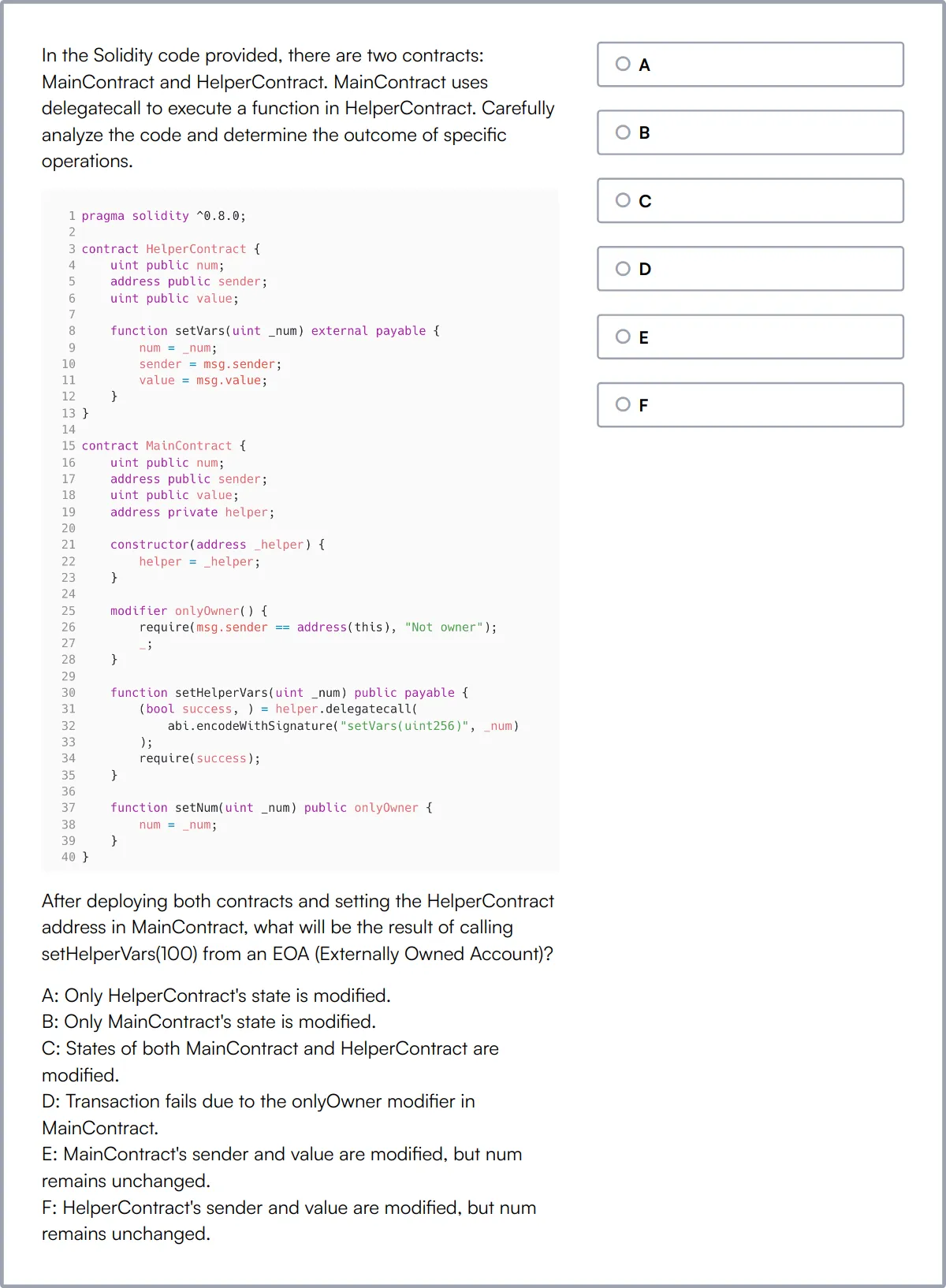
Blockchain Developer Test
Our Blockchain Developer Test evaluates candidates on their technical knowledge and practical skills related to blockchain development.
The test covers blockchain architecture, consensus algorithms, smart contracts, cryptocurrency, token economics, decentralized applications (dApps), and blockchain security.
High-scoring candidates show proficiency in building innovative blockchain solutions that solve real-world problems and meet business needs.
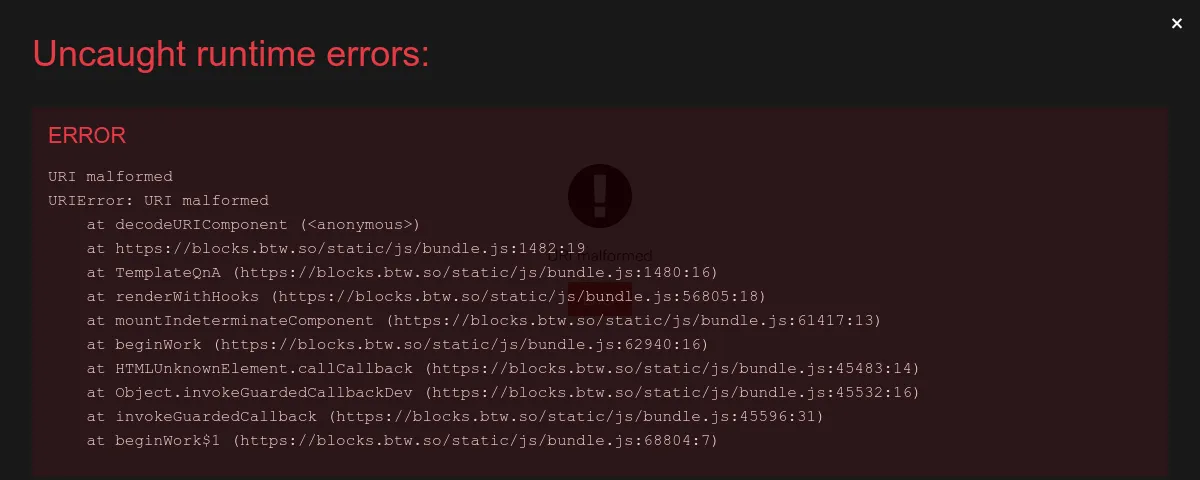
Cryptography Test
Our Cryptography Test evaluates a candidate's knowledge of cryptography concepts, network engineering, and cyber security.
The test covers digital signatures, cryptography algorithms like RSA, hashing techniques, encoding and decoding, and cyber security fundamentals.
Candidates who perform well demonstrate a solid understanding of cryptographic principles and their application in securing data.
Software Engineering Online Test
Our Software Engineering Online Test evaluates candidates on their understanding of core computer science concepts.
The test includes questions on data structures, algorithms, databases, programming paradigms, and design patterns. It also features a coding question to assess problem-solving and hands-on programming ability.
Successful candidates show proficiency in object-oriented programming, database design, and code optimization.
Cyber Security Assessment Test
Our Cyber Security Assessment Test evaluates candidates on cyber security basics and their ability to detect and mitigate security risks.
The test covers network security, cybersecurity attacks, cryptography, web security, email security, malware, data security, and cybersecurity defenses.
Candidates who excel demonstrate a strong understanding of network protocols, security measures, and risk assessment techniques.
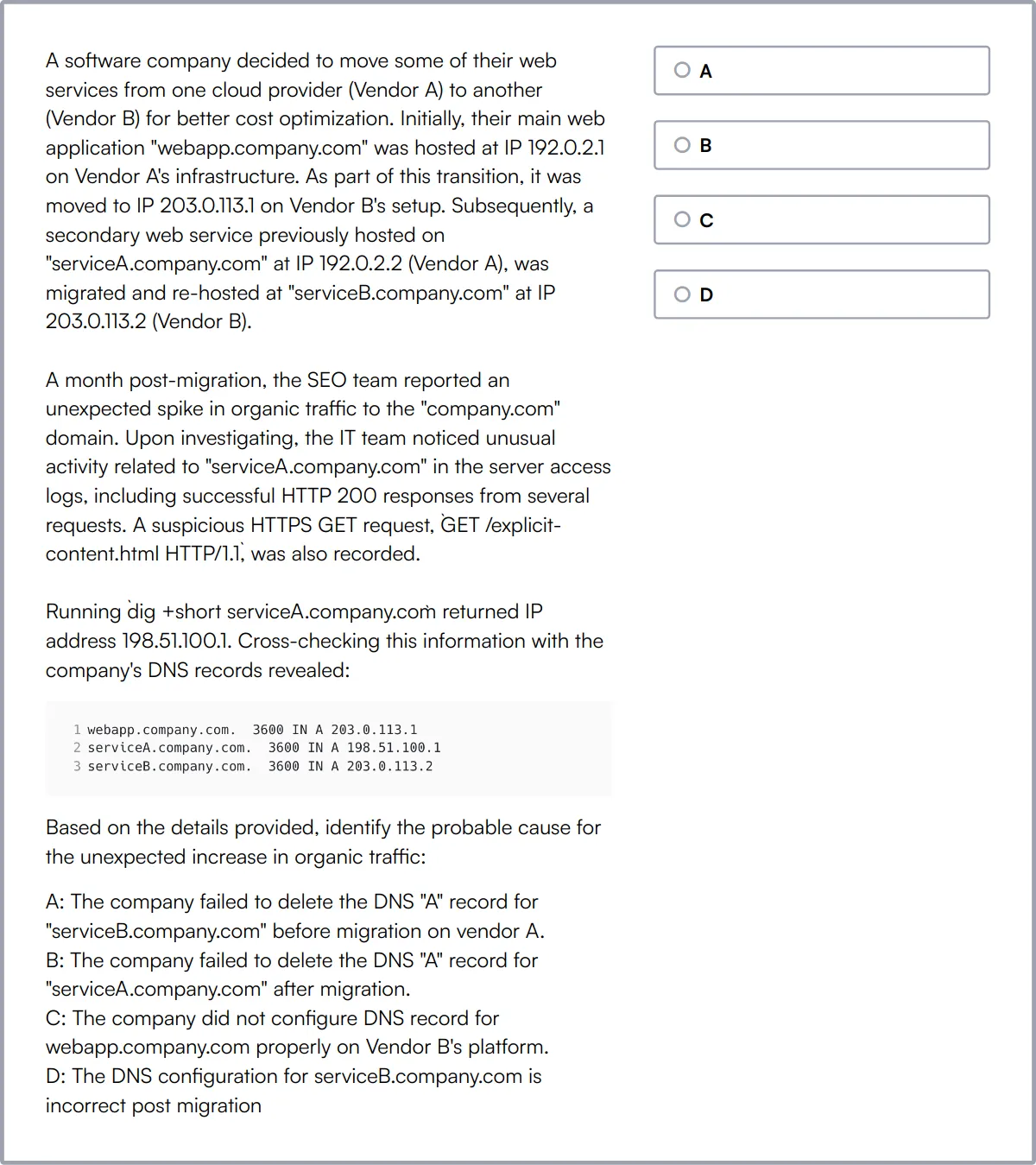
REST API Test
Our REST API Test evaluates a candidate's understanding of RESTful APIs and their ability to create, interact, and test them.
The test includes questions on REST principles, HTTP methods, status codes, authentication, serialization formats, and best practices.
High-scoring candidates show proficiency in designing backend services and integrating APIs effectively.
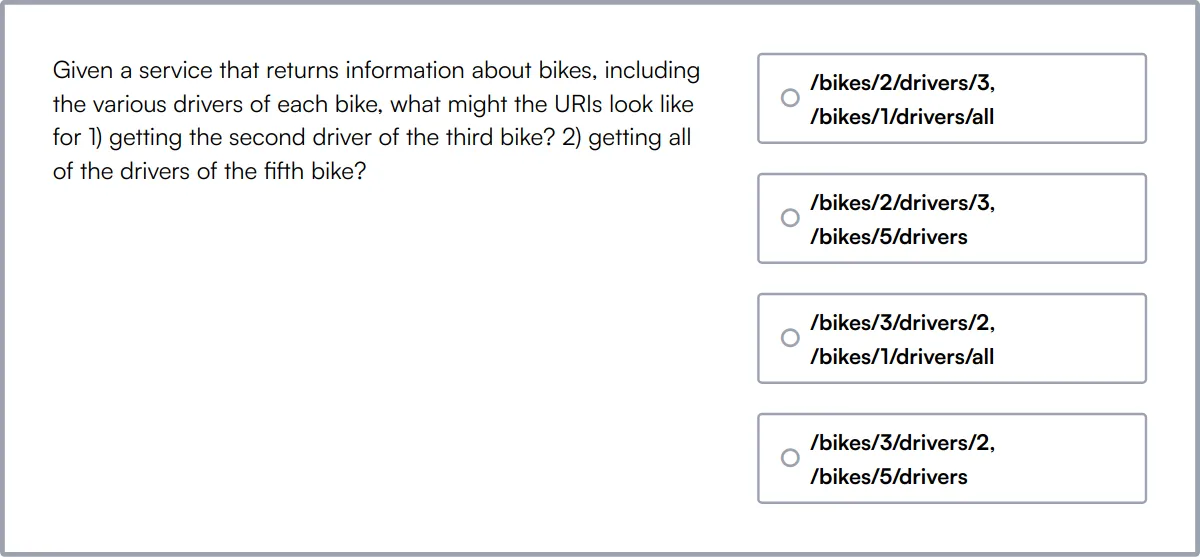
Summary: The 8 key Blockchain Developer skills and how to test for them
| Blockchain Developer skill | How to assess them |
|---|---|
| 1. Smart Contract Development | Evaluate the ability to write and deploy secure smart contracts. |
| 2. Blockchain Architecture | Assess understanding of blockchain structure and its components. |
| 3. Cryptography | Check knowledge of encryption techniques and cryptographic algorithms. |
| 4. Ethereum Platforms | Gauge experience with Ethereum and its ecosystem. |
| 5. Data Structures | Determine proficiency in using data structures for blockchain. |
| 6. Consensus Algorithms | Evaluate understanding of consensus mechanisms like PoW and PoS. |
| 7. Network Security | Assess skills in securing blockchain networks against threats. |
| 8. API Integration | Check ability to integrate blockchain with external systems via APIs. |
Blockchain Developer Test
Blockchain Developer skills FAQs
What are the key skills required for a Blockchain Developer?
Key skills include Smart Contract Development, Blockchain Architecture, Cryptography, Ethereum Platforms, Data Structures, Consensus Algorithms, Network Security, API Integration, Node.js, Solidity, Database Management, Cloud Technologies, Frontend Development, Version Control, Testing Frameworks, Agile Methodologies, and Networking.
How can I assess a candidate's proficiency in Smart Contract Development?
Assess their experience with Solidity, their ability to write and deploy smart contracts, and their understanding of security best practices in smart contract development.
Why is knowledge of Blockchain Architecture important for a Blockchain Developer?
Understanding Blockchain Architecture helps developers design and implement scalable and secure blockchain solutions, ensuring efficient data management and transaction processing.
What should I look for when evaluating a candidate's expertise in Cryptography?
Check their understanding of cryptographic algorithms, encryption/decryption methods, and their ability to implement secure cryptographic protocols in blockchain applications.
How important is experience with Ethereum Platforms for a Blockchain Developer?
Experience with Ethereum Platforms is crucial as it is one of the most widely used blockchain platforms. Look for familiarity with tools like Truffle, Ganache, and MetaMask.
What are Consensus Algorithms and why are they important?
Consensus Algorithms ensure all nodes in a blockchain network agree on the state of the ledger. Key algorithms include Proof of Work (PoW), Proof of Stake (PoS), and Delegated Proof of Stake (DPoS).
How can I evaluate a candidate's skills in API Integration?
Assess their experience with RESTful and GraphQL APIs, their ability to integrate third-party services, and their understanding of API security practices.
What role does Node.js play in Blockchain Development?
Node.js is often used for building backend services in blockchain applications. Look for experience in writing server-side code, handling asynchronous operations, and integrating with blockchain networks.

40 min skill tests.
No trick questions.
Accurate shortlisting.
We make it easy for you to find the best candidates in your pipeline with a 40 min skills test.
Try for freeRelated posts



